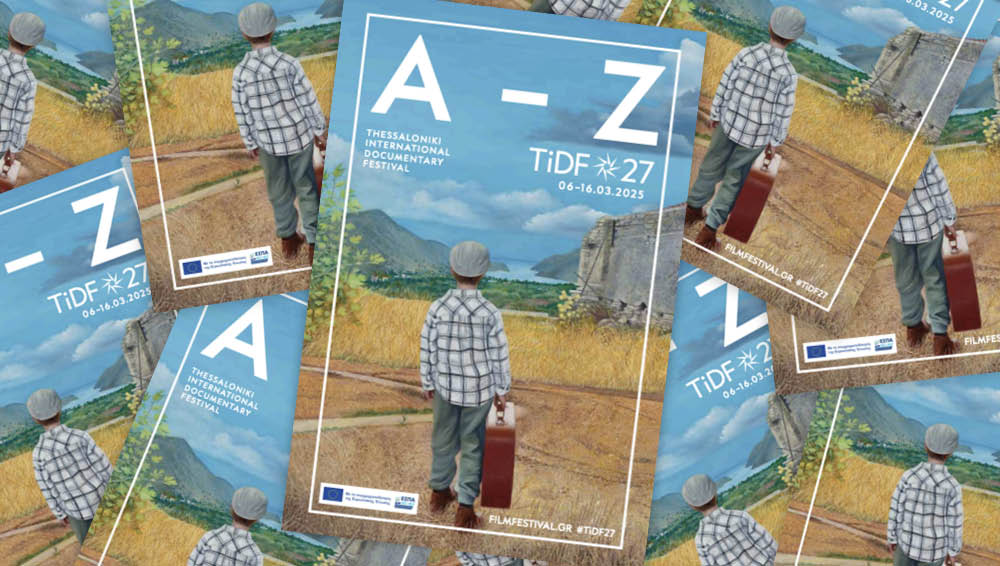PRESS CONFERENCE
As part of the 17th Thessaloniki Documentary Festival, the directors Marc Schmidt (The Chimpanzee Complex), Kordula Hildebrandt (Spirit Berlin) and Yuki Kokubo (Made in Kasama - Kasamayaki) attended a press conference on Tuesday March 17, 2015.
The first director to speak was Marc Schmidt. His documentary The Chimpanzee Complex talks about what goes on at a facility for the protection of abused animals and focuses on the difficult task of their rehabilitation. The director noted that “Only a few such centers exist in Europe. There are some in the Netherlands, Belgium and the United Kingdom, but at the same time there are many instances of abused animals in the rest of Europe, from Romania to France and from Belgium to Portugal. There are animal protection groups that document such cases. In many countries, such as France and Belgium it's not forbidden to have a chimpanzee at home as a pet even though it’s against the law to buy one - if you have one you can keep it. The owners of these animals are not punished. The animals are simply transferred to these centers”. While filming, Schmidt realized that even though chimpanzees are cute when they’re small, as they grow older they can become very wild. The film also talks about the ethical dilemmas related to the way carers approach abused animals.
“While filming I came up against a very important question. Can we understand this animal, this creature? In the case of chimpanzees, you can observe them but you can't know what they're thinking. Some animals have been humanized to a certain degree. For example, some chimpanzees eat with a spoon. One member of the crew said that they look like psychiatric patients.” Attempts to rehabilitate abused animals are not always successful. “The degree of success isn't as high as some of the centers claim. It's usually 50-50. Of course great improvements have been made. In the film I also criticize some centers for the fact that they pressure chimpanzees, which sometimes suffer from depression, and force them to live with other animals, even though they would probably prefer to be on their own”.
Yuki Kokubo’s Made in Kasama (Kasamayaki) is an altogether different kind of documentary. The director travelled to Japan to examine to re-connect with her parents. About her trip the director said: “I’ve been living in New York since I was 16, far from my family. In my 30s, my curiosity to meet my family grew inside of me. The film was a tool for me.“
With regards to the social reality that she encountered in Japan, Kokubo observed: “As a child living in New York I didn't have much of a connection to the culture of Japan. What I realized was that after the earthquake of 2011, a major change occurred in Japanese people. The biggest change was their massive distrust in the government. They used to be very compliant people and there weren’t a lot of demonstrations. But now they don’t trust what they hear on the news anymore and they don’t trust local politicians either. In the area where my family lived, even though it’s far from the danger zone, entire families have left the country to live abroad, because the situation is so precarious”.
Kordula Hildebrandt attempts a different trip, into the world of spirituality, in Spirit Berlin. Her hero is a young actor Stefan, who is seeking inner peace by alternative means, in the heart of Berlin. Talking about her experience filming, Hildebrand said: “When I started making my film I was a yoga instructor. I would meditate and travel a lot. Basically, I had already made the trip that my hero made in the film. I decided to make the film to find an answer to the question “What is the meaning of life?” Why are we here in the world?
In the film, I collected fragments of interviews with famous people of Indian culture, like Ravi Shankar and also Germans who work with healing processes. I thought that these people would give me answers to my questions. What happened in the end was that the film changed me. After filming my documentary I realized that no one could give me the answers that I was looking for, simply because no such answers existed. So, I calmed down. I believe that all roads lead to Rome and that it is your own decision to fulfil yourself. To do so, you must make it clear to yourself that you want inner peace. You need to create room inside yourself, to plant the seed and let it grow”.















